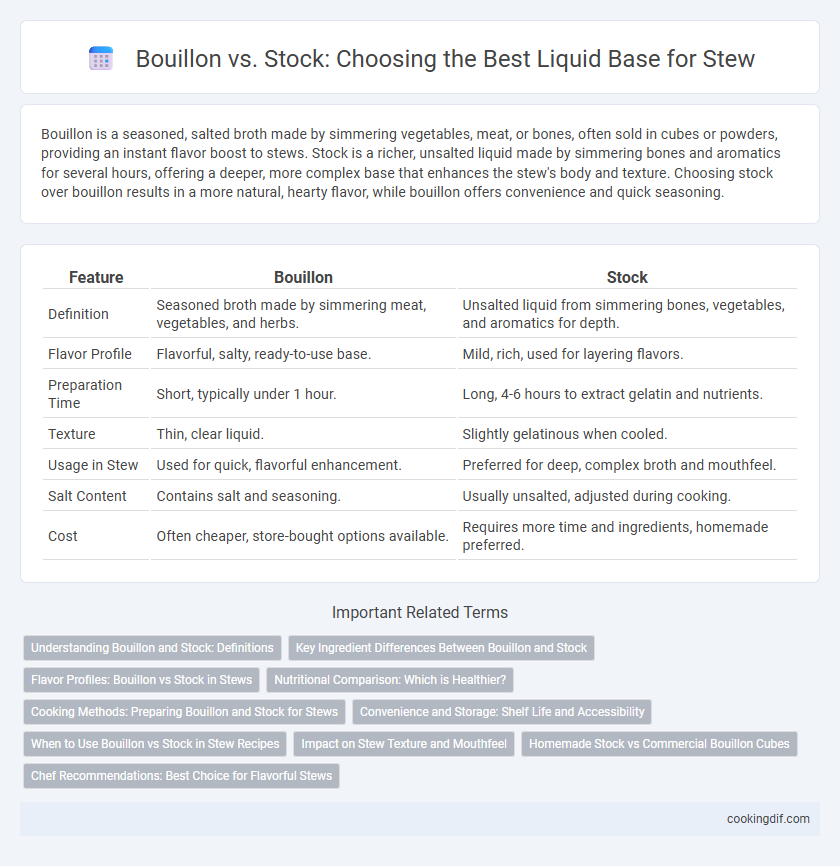Bouillon is a seasoned, salted broth made by simmering vegetables, meat, or bones, often sold in cubes or powders, providing an instant flavor boost to stews. Stock is a richer, unsalted liquid made by simmering bones and aromatics for several hours, offering a deeper, more complex base that enhances the stew's body and texture. Choosing stock over bouillon results in a more natural, hearty flavor, while bouillon offers convenience and quick seasoning.
Table of Comparison
| Feature | Bouillon | Stock |
|---|---|---|
| Definition | Seasoned broth made by simmering meat, vegetables, and herbs. | Unsalted liquid from simmering bones, vegetables, and aromatics for depth. |
| Flavor Profile | Flavorful, salty, ready-to-use base. | Mild, rich, used for layering flavors. |
| Preparation Time | Short, typically under 1 hour. | Long, 4-6 hours to extract gelatin and nutrients. |
| Texture | Thin, clear liquid. | Slightly gelatinous when cooled. |
| Usage in Stew | Used for quick, flavorful enhancement. | Preferred for deep, complex broth and mouthfeel. |
| Salt Content | Contains salt and seasoning. | Usually unsalted, adjusted during cooking. |
| Cost | Often cheaper, store-bought options available. | Requires more time and ingredients, homemade preferred. |
Understanding Bouillon and Stock: Definitions
Bouillon is a clear, seasoned broth made by simmering meat, vegetables, and herbs, often concentrated into cubes or powders for convenience. Stock is a rich, unseasoned liquid created by slow-cooking bones, connective tissues, and aromatics to extract gelatin and flavor, providing a thicker texture. Both serve as foundational liquids in stews, but bouillon adds immediate seasoning while stock contributes depth and body.
Key Ingredient Differences Between Bouillon and Stock
Bouillon and stock differ primarily in preparation and ingredient concentration, with bouillon made from dehydrated meat, vegetables, and seasonings, offering a concentrated flavor in cube or powder form, while stock is simmered from bones, mirepoix, and aromatics, resulting in a richer, gelatinous liquid. Bouillon's convenience and intense saltiness contrast with stock's natural gelatin content and subtle depth derived from slow cooking bones. These key ingredient differences influence stew base choices, where stock provides a hearty mouthfeel and bouillon delivers quick, potent seasoning.
Flavor Profiles: Bouillon vs Stock in Stews
Bouillon delivers a concentrated, robust flavor often achieved through dehydrated or gelatinous forms, making it ideal for stews that require an intense, savory depth. Stock offers a more subtle, natural taste derived from simmered bones, vegetables, and aromatics, lending a rich, balanced foundation that enhances but does not overpower other ingredients in stews. Choosing between bouillon and stock significantly impacts the stew's flavor complexity and mouthfeel, with bouillon amplifying umami and stock providing a smoother, layered profile.
Nutritional Comparison: Which is Healthier?
Bouillon and stock differ significantly in nutritional content, with bouillon often containing higher sodium levels due to concentrated salts and additives, which can impact cardiovascular health. Stock, typically made from simmered bones, vegetables, and herbs without added preservatives, provides natural minerals like calcium and magnesium, promoting better nutrient absorption. Choosing low-sodium stock over bouillon enhances overall health benefits, supporting balanced electrolyte levels and reducing the risk of hypertension.
Cooking Methods: Preparing Bouillon and Stock for Stews
Bouillon is made by simmering vegetables, herbs, and sometimes meat or bones briefly to extract flavors, resulting in a clear, flavorful liquid ideal for light stews. Stock requires long simmering of bones with connective tissue and aromatics over several hours, creating a rich, gelatinous base that thickens and intensifies the stew's texture and depth. Using stock enhances stews by providing collagen-derived mouthfeel, while bouillon offers a quicker, lighter flavor infusion.
Convenience and Storage: Shelf Life and Accessibility
Bouillon offers superior convenience with its long shelf life, typically lasting up to two years in dehydrated or cube form, and easy accessibility in most grocery stores. Stock, often made fresh or purchased refrigerated, requires more careful storage and generally has a shorter shelf life of about 3 to 4 days when fresh, or a few months if frozen. For stew preparation, bouillon provides a reliable pantry staple, while stock offers richer flavor but demands more planning for storage and use.
When to Use Bouillon vs Stock in Stew Recipes
Bouillon is ideal for quick stew recipes or when a strong, concentrated flavor is needed, as it dissolves rapidly and provides consistent seasoning. Stock, made from simmering bones and vegetables, suits slow-cooked stews that benefit from a rich, gelatinous texture and complex depth enhanced by prolonged cooking. Choose bouillon for convenience and intensity, while stock is preferred for traditional stews requiring layered, natural flavors.
Impact on Stew Texture and Mouthfeel
Bouillon, typically seasoned and concentrated, intensifies stew flavor but can alter texture by adding saltiness and a slightly thinner mouthfeel compared to stock. Stock, crafted by simmering bones and vegetables for hours, imparts a rich, gelatinous body that enhances the stew's thickness and velvet-like texture. The collagen in homemade stock improves stew mouthfeel by providing a silky, full-bodied consistency that bouillon often lacks.
Homemade Stock vs Commercial Bouillon Cubes
Homemade stock offers a rich, natural flavor and superior depth to stews due to its slow simmering of bones, vegetables, and herbs, allowing gelatin and nutrients to infuse the liquid. Commercial bouillon cubes provide convenience and a concentrated taste but often contain high levels of sodium, preservatives, and artificial flavor enhancers that can alter the stew's quality. Choosing homemade stock ensures better control over ingredients, resulting in a healthier, more authentic base that enhances the stew's overall taste and texture.
Chef Recommendations: Best Choice for Flavorful Stews
Chefs recommend using homemade stock over bouillon for stews due to its richer, more complex flavors derived from simmering bones and vegetables for hours. Stock provides a natural depth and body that enhances the stew's overall taste, whereas bouillon often contains added salt and preservatives that can overpower subtle ingredients. For the most flavorful stew, a well-crafted stock is the best choice, delivering authentic umami and richness.
Bouillon vs Stock for liquid base Infographic

 cookingdif.com
cookingdif.com